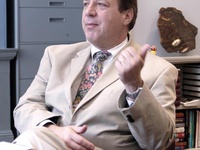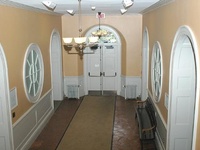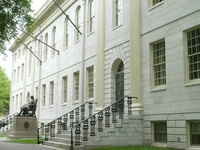Todd says that while he worked well with Lewis, he found that there were omissions and overlaps that resulted from the separation of the two offices.
“Each individual component of [undergraduate education] has increased and no individual person is there to oversee and consider all these things,” Todd says, adding that there were some cases where the two-dean structure proved inefficient.
“There are probably some things on Lewis’ side of the hall that the dean of undergraduate education should be charged with,” he says.
Associate Dean of Undergraduate Education Jeffrey Wolcowitz, who has held the office for over two decades, says that he has seen a gradual expansion of the role of the dean of undergraduate education.
“It was just inevitable that as the office of the dean of undergraduate education grew over time the two offices became more distinct and had more independent identities,” Wolcowitz says, adding that the two offices still collaborated. “The distinction becomes odd, and that’s what sets the stage for the change.”
Both Todd and Lewis say that advising—an area that pertains to both academic and social life in the college—is one such responsibility that often gets lost in the shuffle between the two decanal jurisdictions.
Advising is expected to be a key issue in both the curricular review and in restructuring.
“I think our advising system is terrible,” Kirby says. “The most serious academic advice we can now give you is during shopping period.”
Gross and Kirby both hope that the consolidation of the deanship will help solve the advising problems that have arisen in recent years.
“Advising is a huge issue,” Gross says. “There are a lot of concerns there. It’s a question of coordination, and the combination of the two offices is beneficial in this way.”
Gross says that early next year he plans to assemble various advisors—from freshman proctors and head tutors to the Bureau of Study Council—to coordinate their activities. He also hopes that closing the gap between head and senior tutors will get the House more involved in advising students.
The emphasis on advising highlights the consequences on pedagogy and student-faculty interaction that the restructuring may have.
The one recommendation of the Lewis-Maull Report that Knowles did decide to follow through on arose from the pressing issue of getting professors more involved in student life.
“I think the one thing on which we were unanimous was that there should be more faculty involvement in College affairs, and that happened, of course,” Lewis says.
And now, as the loftier responsibilities of the Dean of the College accrue, and the others are sloughed off onto lower level deans and administrators, the dean of the College may find himself in a stronger position as a lobbying voice for students amidst his colleagues in the Faculty.
Read more in News
Pataki: 'Yale is Going to Crush Harvard'















